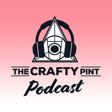
Understanding Sustainable Brewing
"A lot of customers are very concerned about their carbon footprint."
For all the challenges faced by the beer industry, it’s one that continues to forge ahead in many areas, not least when it comes to sustainability.
Whether the focus is powering breweries, recycling or reusing ingredients, supporting organic and regenerative farming practices, or creating new and innovative ways of cutting waste, the brewing industry and those with which it shares a symbiotic relationship are often hotbeds for fostering sustainable practices.
It’s an area we’ve covered extensively on The Crafty Pint and, in this episode of our podcast, Craig Williams brings together a panel of pioneers from different businesses helping drive industries in a more eco-friendly direction.
He’s joined by George Wade, co-founder of UK-based Zevero, which helps breweries calculate their carbon emissions, Tom Field, founder of Sydney-based Bearhug Pallet Wraps, and Jonathon Buntz, from Ecogrip, producer of 100 percent Australian-owned and manufactured recycled plastic can holders.
As well as exploring the genesis for each of their businesses and how they’re helping customers operate in a more sustainable manner, they discuss the benefits to brewers, the challenges of persuading more businesses to implement new sustainability measures in tough economic times, and how business owners can take their first steps in this direction.
Prior to the panel discussion, Craig is joined by James at Moffat Beach Brewing’s Caloundra Production House (where they’d recorded a future show) to look back at another big week in beer – and that was before the news about Fox Friday’s voluntary administration broke.
The Akasha-Wayward unification and rebirth of Molly Rose from liquidation, plus a recent post by Phil Cook on his Beer Diary site, spark a discussion about independence, its meaning and relevance, while Craig offers insight on Steve Jeffares’ takeover of the former Deeds Brewing site, after working with him on GABS for four years.
We pump up the launch of the Pint of Origin program ahead of the festival’s return on May 9, and in the middle of the show shout out the latest winners in the Have You Done A Rallings? campaign celebrating good beer citizens – nominate yours here.
Start of segments:
- 17:12 – Sustainability Panel Part 1
- 34:12 – Have You Done A Rallings Winners
- 38:49 – Sustainability Panel Part 2
Other relevant links
- Zevero's Starter Sustainability Kit For Brewers
- Bearhug Pallet Wraps
- Ecogrip
- Nominate a Brewery of the Month
To find out more about supporting the show or otherwise partnering with The Crafty Pint, contact craig@craftypint.com.
NB We mention a travel article on Québec in the intro, but publication has been pushed back due to the breaking news regarding Fox Friday.
